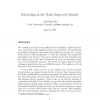105
click to vote
STOC
1999
ACM
15 years 6 months ago
1999
ACM
We propose the first combinatorial solution to one of the most classic problems in combinatorial optimization: the generalized minimum cost flow problem (flow with losses and g...
117
click to vote
STOC
1999
ACM
15 years 6 months ago
1999
ACM
Oblivious polynomial evaluation is a protocol involving two parties, a sender whose input is a polynomial P, and a receiver whose input is a value α. At the end of the protocol t...
102
click to vote
STOC
1999
ACM
15 years 6 months ago
1999
ACM
We give an O( log n) factor approximation algorithm for covering a rectilinear polygon with holes using axis-parallel rectangles. This is the first polynomial time approximation a...
103
click to vote
STOC
1999
ACM
15 years 6 months ago
1999
ACM
Given an undirected graph with edge costs and a subset of k ≥ 3 nodes called terminals, a multiway, or k-way, cut is a subset of the edges whose removal disconnects each termina...
STOC
1999
ACM
15 years 6 months ago
1999
ACM
STOC
1999
ACM
15 years 6 months ago
1999
ACM
100
click to vote
STOC
1999
ACM
15 years 6 months ago
1999
ACM
In this paper we prove a theorem that gives an (almost) tight upper bound on the sensitivity of a multiple-output Boolean function in terms of the sensitivity of its coordinates an...
118
click to vote
STOC
1999
ACM
15 years 6 months ago
1999
ACM
We investigate the question of when a prover can aid a verifier to reliably compute a function faster than if the verifier were to compute the function on its own. Our focus is ...
108
click to vote
STOC
1999
ACM
15 years 6 months ago
1999
ACM
We considered non-clairvoyant multiprocessor scheduling of jobs with arbitrary arrival times and changing execution characteristics. The problem has been studied extensively when ...





